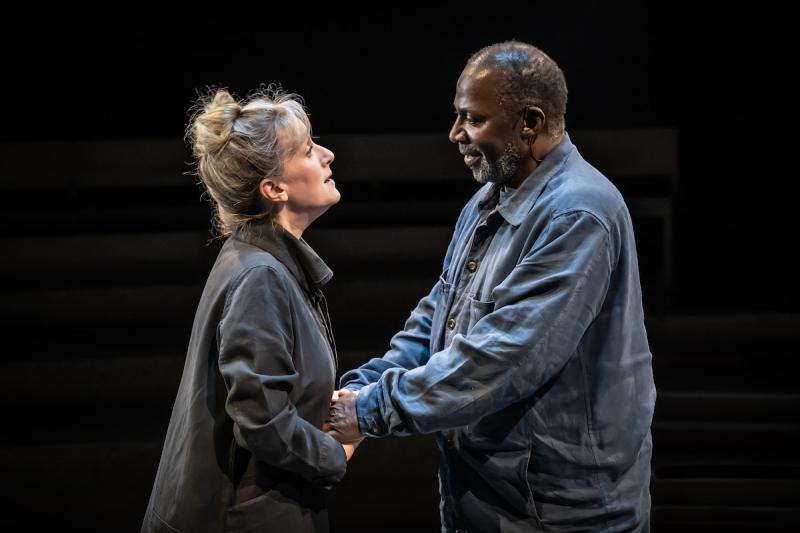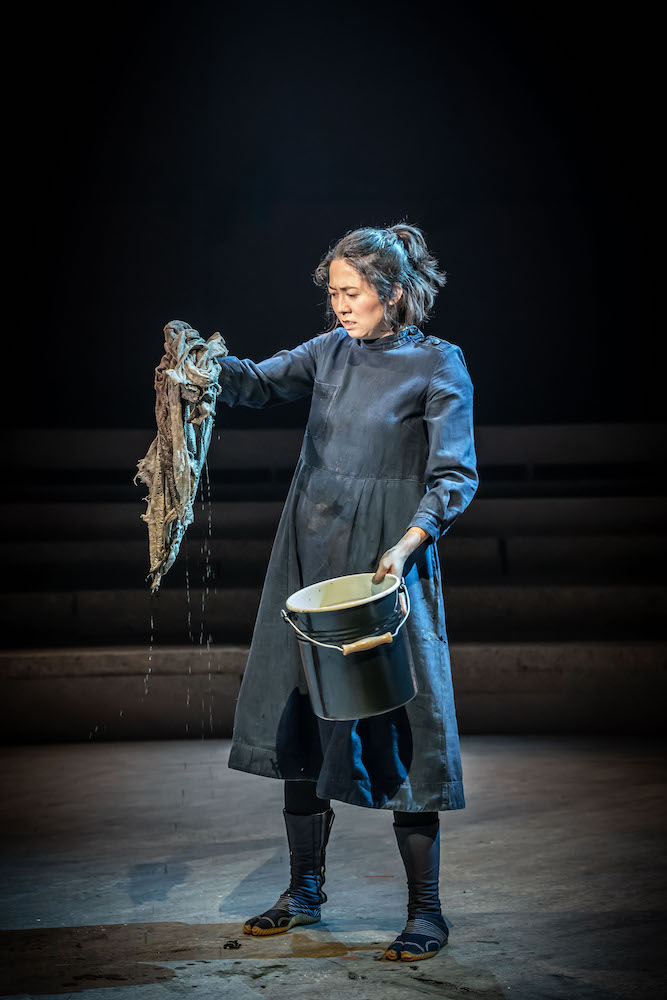Further Than the Furthest Thing, Young Vic review - small island longings | reviews, news & interviews
Further Than the Furthest Thing, Young Vic review - small island longings
Further Than the Furthest Thing, Young Vic review - small island longings
Empathetic revival of Zinnie Harris’s 2000 play about a lost world

Some plays are instantly forgettable, others leave a tender fold in the memory. I well remember seeing Zinnie Harris’s evocatively titled Further Than the Furthest Thing in 2000, and marveling at its strange beauty and linguistic flair.
Based on events that happened on Tristan da Cunha, an island in the South Atlantic whose 268 inhabitants were evacuated by the British government in 1961 after a volcanic eruption, the play dreamily recreates a lost world. Harris pictures a community that time has forgotten, a mixture of cultures, part Napoleonic, part Victorian and partly modern, whose language is a quirky but attractive version of English and whose isolation means the inhabitants are suspicious of strangers and unaware of modernity. This is no island paradise, but a place of grim poverty as well as strong bonds.
 The plot centres on a gnarled handful of characters: Mill (Jenna) is married to chaplain Bill (Nri) and wants to keep hold of Francis, her dead sister’s son who she has brought up, despite his desire to leave the island. After he returns from a trip to South Africa, he brings with him Mr Hansen, an industrialist who offers to modernise the island economy. At the same time, Francis is attracted to Rebecca, a young woman who is pregnant by another man. When the volcano erupts, the action switches to England, where the islanders have been evacuated. Mill becomes the leader of a campaign to return home, and a guilty secret in the island’s past is revealed.
The plot centres on a gnarled handful of characters: Mill (Jenna) is married to chaplain Bill (Nri) and wants to keep hold of Francis, her dead sister’s son who she has brought up, despite his desire to leave the island. After he returns from a trip to South Africa, he brings with him Mr Hansen, an industrialist who offers to modernise the island economy. At the same time, Francis is attracted to Rebecca, a young woman who is pregnant by another man. When the volcano erupts, the action switches to England, where the islanders have been evacuated. Mill becomes the leader of a campaign to return home, and a guilty secret in the island’s past is revealed.
The theme of how a community is created by a shared sense of place is beautifully portrayed in Harris’s writing. Not only has she created a distinct language and vocabulary for the islanders, but their easy-going sensibility is shown in contrast to Mr Hansen’s vision of industrial and urban modernity. His arrival both tempts them by its promise of wealth and offends them by its indifference to custom. In the second half, set in England, Hansen offers jobs to Francis, Bill, Mill and Rebecca, and – like a patrician Victorian factory owner – sorts out their accommodation problems. But this can’t cure their homesickness.
The play also explores the islanders’ different attitudes to their newfound English identity, often with a comic slant as, for example, Mill parodies the host nation’s manners in a tea-drinking scene. She becomes a stronger and more determined islander in exile, while Francis attempts to assimilate into English society, speaking a standard English and rejecting the individuals who once loved him. The mother country, meantime, cheats these exiles by pretending that their homeland has sunk beneath the waves, while using – it is suggested – the island as a base for atom bomb tests. Oh yes, this is a story about neo-imperialism as well as exiled community.
The sense of homesick migrants, who have different attitudes to their new situation (English housing, English factory jobs, English manners), comes across strongly, and resonates with the experience of other arrivals to these shores. There is both bewilderment, seen especially in Bill’s anguish at having to work regular shifts timed by the clock rather than the seasons, and bitterness about the refusal of the British government to allow the islanders to return. Likewise, they experience the racist condescension of the media, with Rebecca literally fighting back against an instructive and patronising news reporter.
Tang’s production is strong on visual images, but less sure when it comes to some of the early scenes, although most of the drama of the second half is powerfully delivered. On a revolving stage, designer Soutra Gilmour creates a simple staging, with the pick-and-mix costumes of the characters creating the necessary sense of strangeness. Impressive volcanic tremors are created by Ian William Galloway’s video work, with help from George Dennis’s sound, while a live vocalist, Shapla Salique, provides an otherworldly spirit of place.
Although Tang and the cast struggle sometimes to find the music in Harris’s text, every performer makes a memorable contribution. Russell’s Mill visibly grows in stature as she leads the islanders' campaign and her revelation of the community’s wartime secret is heart-rending. Although it’s hard to make sense of Bill being given a responsible job in England (a rare absurdism in the script), Nri conveys his character’s fortitude as well as his loss of identity. Rebecca, played by Kirsty Rider (pictured above), has an excruciating black-blood birth scene, Gerald Kyd’s Hansen delights with his magic tricks and Archie Madekwe’s Francis embodies the uncertainties of cultural assimilation. Despite some uncertain passages, this is an empathetic revival of a contemporary classic.
rating
Explore topics
Share this article
The future of Arts Journalism
You can stop theartsdesk.com closing!
We urgently need financing to survive. Our fundraising drive has thus far raised £49,000 but we need to reach £100,000 or we will be forced to close. Please contribute here: https://gofund.me/c3f6033d
And if you can forward this information to anyone who might assist, we’d be grateful.

Subscribe to theartsdesk.com
Thank you for continuing to read our work on theartsdesk.com. For unlimited access to every article in its entirety, including our archive of more than 15,000 pieces, we're asking for £5 per month or £40 per year. We feel it's a very good deal, and hope you do too.
To take a subscription now simply click here.
And if you're looking for that extra gift for a friend or family member, why not treat them to a theartsdesk.com gift subscription?
more Theatre
 Ragdoll, Jermyn Street Theatre review - compelling and emotionally truthful
Katherine Moar returns with a Patty Hearst-inspired follow up to her debut hit 'Farm Hall'
Ragdoll, Jermyn Street Theatre review - compelling and emotionally truthful
Katherine Moar returns with a Patty Hearst-inspired follow up to her debut hit 'Farm Hall'
 Troilus and Cressida, Globe Theatre review - a 'problem play' with added problems
Raucous and carnivalesque, but also ugly and incomprehensible
Troilus and Cressida, Globe Theatre review - a 'problem play' with added problems
Raucous and carnivalesque, but also ugly and incomprehensible
 Clarkston, Trafalgar Theatre review - two lads on a road to nowhere
Netflix star, Joe Locke, is the selling point of a production that needs one
Clarkston, Trafalgar Theatre review - two lads on a road to nowhere
Netflix star, Joe Locke, is the selling point of a production that needs one
 Ghost Stories, Peacock Theatre review - spirited staging but short on scares
Impressive spectacle saves an ageing show in an unsuitable venue
Ghost Stories, Peacock Theatre review - spirited staging but short on scares
Impressive spectacle saves an ageing show in an unsuitable venue
 Hamlet, National Theatre review - turning tragedy to comedy is no joke
Hiran Abeyeskera’s childlike prince falls flat in a mixed production
Hamlet, National Theatre review - turning tragedy to comedy is no joke
Hiran Abeyeskera’s childlike prince falls flat in a mixed production
 Rohtko, Barbican review - postmodern meditation on fake and authentic art is less than the sum of its parts
Łukasz Twarkowski's production dazzles without illuminating
Rohtko, Barbican review - postmodern meditation on fake and authentic art is less than the sum of its parts
Łukasz Twarkowski's production dazzles without illuminating
 Lee, Park Theatre review - Lee Krasner looks back on her life as an artist
Informative and interesting, the play's format limits its potential
Lee, Park Theatre review - Lee Krasner looks back on her life as an artist
Informative and interesting, the play's format limits its potential
 Measure for Measure, RSC, Stratford review - 'problem play' has no problem with relevance
Shakespeare, in this adaptation, is at his most perceptive
Measure for Measure, RSC, Stratford review - 'problem play' has no problem with relevance
Shakespeare, in this adaptation, is at his most perceptive
 The Importance of Being Earnest, Noël Coward Theatre review - dazzling and delightful queer fest
West End transfer of National Theatre hit stars Stephen Fry and Olly Alexander
The Importance of Being Earnest, Noël Coward Theatre review - dazzling and delightful queer fest
West End transfer of National Theatre hit stars Stephen Fry and Olly Alexander
 Get Down Tonight, Charing Cross Theatre review - glitz and hits from the 70s
If you love the songs of KC and the Sunshine Band, Please Do Go!
Get Down Tonight, Charing Cross Theatre review - glitz and hits from the 70s
If you love the songs of KC and the Sunshine Band, Please Do Go!
 Punch, Apollo Theatre review - powerful play about the strength of redemption
James Graham's play transfixes the audience at every stage
Punch, Apollo Theatre review - powerful play about the strength of redemption
James Graham's play transfixes the audience at every stage
 The Billionaire Inside Your Head, Hampstead Theatre review - a map of a man with OCD
Will Lord's promising debut burdens a fine cast with too much dialogue
The Billionaire Inside Your Head, Hampstead Theatre review - a map of a man with OCD
Will Lord's promising debut burdens a fine cast with too much dialogue

Add comment